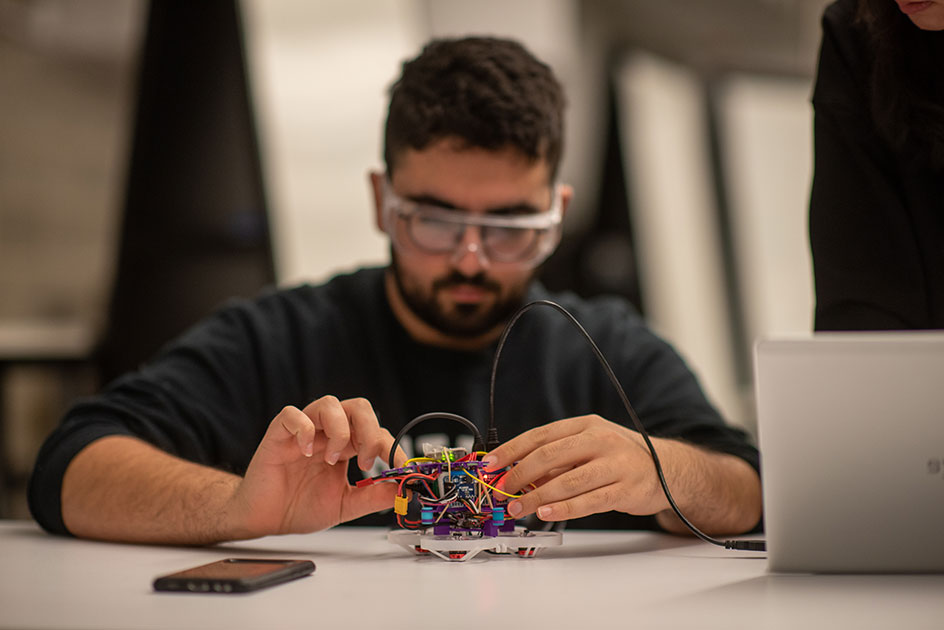Crash Course in Robotics Puts Alumnus on Fast Track After Graduation

When Maurice Rahme (MSR ’20) spent the summer of 2017 as an undergraduate electrical engineering intern for Jaguar Land Rover in the UK, little did he know that a volunteer project would change the course of his career trajectory.
Rahme offered to help design the company’s 4xX In Schools Technology Challenge, which tasks high school students with designing and coding self-driving vehicles. The highlight for Rahme, then a bachelor’s candidate in electrical and mechanical engineering at The University of Edinburgh in Scotland, was designing an autonomous line following task, a self-driving robot that detects and follows a line. This first robotics experience inspired him to pursue Northwestern Engineering’s Master of Science in Robotics (MSR),.
“There are no cookie-cutter solutions in robotics,” Rahme said. “There is a lot more room to innovate.”
Now an MSR alumnus, Rahme will join Boston Dynamics this fall as a software engineer to work on Handle, the company’s mobile robot that moves boxes in warehouses.
Rahme took time to reflect on the lessons he learned in the program and how he plans to use his skills at his new job.
What interested you about Northwestern’s robotics program?
In my undergraduate years, the bulk of my engineering knowledge was achieved through extracurriculars like Formula Student, a student engineering competition held annually in the UK where students design, test, and race a formula-style racing car. The main thing I was looking for in a master’s program was a hands-on learning experience. Theory is important, but it's often difficult to learn without concrete examples, and the skills I've learned through projects have never left me. Looking back, MSR faculty were very effective in building a project-based curriculum. Whether they taught Bayesian filters, reinforcement learning, kinematics, or simultaneous localization and mapping (SLAM), each of their courses was based around one or multiple projects that I had to complete totally from scratch. You don't get to use any fancy libraries, and that's a good thing.
What was one of the most important lessons you learned in the program?
The most important skill I learned, thanks to MSR, is the ability to read papers and documentation. Robotics is a new and growing field that is often written about poorly and confusingly. In the Embedded Systems in Robotics course, you get an excellent introduction to Robot Operation System (ROS). After the basics are covered, you're mostly on your own when trying to decipher the advanced documentation. Initially, this was frustrating, but most of my peers will agree that this approach was essential to our mastery of ROS and our ability to adapt to its many changes. Your professors won't be there to explain things to you forever, so learning the ability to break things down is paramount.
How has your MS in robotics degree impacted your job search?
In the year that I joined, Matthew Elwin, assistant professor of instruction in mechanical engineering, taught a course on mobile robot kinematics and SLAM in C++. It was a very difficult but rewarding course and has made a massive impact on my job search. I'm not exaggerating when I say that you'll learn the equivalent of three years of C++ in a single quarter, and its final project has been a major talking point in every single job interview that I've had. In short, you program a real Turtlebot3's Kinematics and SLAM capabilities using its onboard LIDAR from scratch in C++.
How do you plan to use the skills you gained in the robotics program in your next steps?
At Boston Dynamics, I will mainly be working in C++ and interfacing with microcontrollers, brushless DC motors, and various types of encoders. The messaging and data logging protocols from ROS will definitely come in handy, as will my training in robot kinematics and dynamics when I design increasingly complicated motion testing profiles for Handle.
What are three things you’re excited about for the future of robotics?
- Hardware and software are becoming more accessible each day, and I'm excited to see what roboticists are able to achieve with small budgets.
- ROS2 is very exciting and is well poised to streamline multi-robot operations. Although I am a big fan of Linux, the inclusion of Windows support in ROS2 should make it more accessible.
- Graphics processing units are becoming more affordable and efficient, which has heightened the possibility of real-time, model-based control on mobile robots.
Do you have any advice to incoming students of the MSR program?
This program will offer you many avenues to push yourself and learn more than you thought was possible in this timeframe, but no one will force you to do it. The amount of support you will receive here is unmatched, but you have to ask for and make the most of it.

